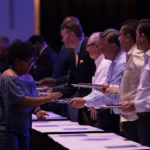Messengers to Texas Baptists’ 2016 annual meeting this week found themselves between the proverbial rock and a hard place—affirm a longstanding biblical interpretation or support a cherished Baptist principle.
 Marv KnoxNot surprisingly, the majority voted to endorse Baptists’ traditional view of marriage and human sexuality. They declared “any church which affirms any sexual relationship outside the bonds of a marriage between one man and one woman be considered out of harmonious cooperation with the Baptist General Convention of Texas.”
Marv KnoxNot surprisingly, the majority voted to endorse Baptists’ traditional view of marriage and human sexuality. They declared “any church which affirms any sexual relationship outside the bonds of a marriage between one man and one woman be considered out of harmonious cooperation with the Baptist General Convention of Texas.”
Their vote trumped an appeal to the BGCT’s historic affirmation of local-church autonomy. A generation ago, that banner rallied Texas Baptists and enabled the state convention to resist the ultra-conservative juggernaut that took over the Southern Baptist Convention.
Technically, practically
Technically, messengers were not asked to affirm same-sex marriage or same-gender sexual relationships. Speaker after speaker who opposed the motion to remove LGBT-affirming congregations acknowledged Baptists historically interpreted the biblical norm of sexual relations as one man and one woman for life. They stressed they were asking messengers to respect and endorse the autonomy of those congregations, not endorse homosexual activity.
But practically, messengers voted to affirm one-man, one-woman for life. Speaker after speaker who supported the motion to remove LGBT-affirming congregations warned of the dire consequences of endorsing same-gender sex and either ignored the appeal to church autonomy or argued against its applicability in this case.
Their position represents both historical precedent and contemporary urgency. For 20 centuries, Christians interpreted the Bible to affirm sexual relations exclusively within the bonds of lifetime marriage between one woman and one man.Texas Baptists have endorsed that view in numerous resolutions. It was the primary argument for removing congregations that ordained gay deacons. Many Texas Baptists have held even more tightly to that position in the wake of the Supreme Court’s legalization of same-sex marriage and cultural trends supporting that ruling and normalizing same-gender orientation.
Nuanced, yet vital
Still, the argument for endorsing local-church autonomy is nuanced, yet vital. Many Texas Baptists who wanted to retain LGBT-affirming churches in the state convention also hold the historic, conservative view of sex and marriage. The majority come from churches that hold that historic perspective.
Sign up for our weekly edition and get all our headlines in your inbox on Thursdays
Yet they believe the BGCT should be open to all churches that hold to essential Baptist principles and who wish to participate in the convention. But they don’t think agreement on marriage and sexuality should be among those essentials.
The argument for local-church autonomy is poignant to many Texas Baptists because of its place in recent history. During the “Baptist Battles” of the late 20th century, Texas Baptists resisted the “fundamentalist takeover”/“conservative resurgence” of the SBC in large part because of local-church autonomy.
Specifically, Texas Baptists said they believe the Bible as fervently as anyone, but they don’t believe anyone has the right to tell individuals and congregations how to interpret the Bible or how to act. The primary flash point back then was women in ministry, and especially female pastors. And even though only a tiny number of Texas Baptist churches ever called a female pastor, the vast majority defended their right to do so.
Limits of autonomy
Now, advocating for local-church autonomy at least feels riskier, because the pivotal issue is human sexuality—a, if not the, core issue of individual identity—and not the gender of the person in the pulpit. But risky or not, the question remains the same: Can Baptists respect a congregation that holds a minority position enough to maintain fellowship and collaborate in missions and ministry, upon which they agree wholeheartedly?
The official answer is no. The messengers have spoken, and now the convention’s Executive Board has received the “standard”—the BGCT parliamentarian’s word—for determining convention affiliation: If a church “affirms any sexual relationship outside the bonds of a marriage between one man and one woman,” it is “out of harmonious cooperation” with the convention.
Of course, the BGCT possessed the right to come to this conclusion. Its democratic governance structure calls on churches to send messengers to vote on issues and make decisions on behalf of the whole convention. Duly elected messengers received a motion and voted, and it now is the guideline by which membership is measured.
The BGCT’s position also is understandable. Messengers deemed appeals to church autonomy subordinate to the traditional interpretation of Scripture regarding sex and marriage. Those are longstanding, sincerely held religious beliefs. Baptists historically have defended religious liberty and the priesthood of all believers. So, even those who wished the BGCT had voted to be inclusive can respect the others’ right to their beliefs and appreciate why they hold to them so fervently.
Still, many Texas Baptists—including those who will leave the convention but also many who will remain—grieve the loss of fellowship. For some, this is a matter of “believe right or leave.” But it’s not that simple. These are beloved sisters and brothers—spiritual fellow travelers who hold 99 percent of beliefs in common, but who no longer have a home within the state convention.
Welcome across the spectrum
They will, however, remain welcome within the coverage of the Baptist Standard. For generations, the Standard has been a news journal whose reach and grasp included but exceeded the confines of the BGCT. Obviously, that reach has been defined geographically; our circulation crosses the nation and spans the globe.
But that reach also encompasses the Baptist theological and political spectrum. Across the years, we have covered news about all kinds of Baptists—and other Christians and other faiths, for that matter. We also have distributed a broad range of opinion about a wide array of issues. We will continue to provide that kind of coverage and welcome those varied voices. We believe we can learn from one another and encourage one another—even when we don’t agree.
The Baptist Standard will remain the independent forum for Baptist voices speaking to the challenges of today’s world. We welcome forward-looking people committed to historic Baptist ideals and the spectrum of Baptist voices. We will keep on informing, inspiring and challenging people to live like Jesus.
Follow Marv on Twitter: @marvknoxbs















We seek to connect God’s story and God’s people around the world. To learn more about God’s story, click here.
Send comments and feedback to Eric Black, our editor. For comments to be published, please specify “letter to the editor.” Maximum length for publication is 300 words.